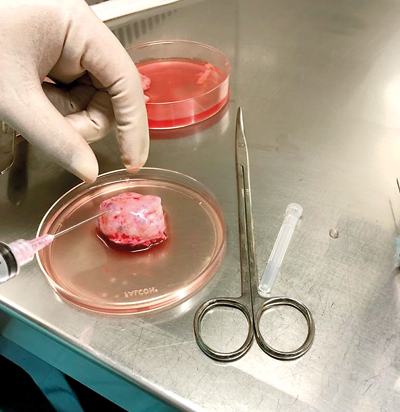A little trailblazer born of a frozen egg

Extraction of ova (eggs) from a surgically- removed ovary prior to dissection to remove the ovarian cortex
Wide-eyed and inquisitive, a pretty six-month-old baby girl is not looking at the person taking the photograph but at her father who is holding her gently.
What the little one does not realize is that she is a trailblazer in Sri Lanka – born of a frozen egg (female gamete or ovum), subsequently thawed and fused with a male gamete (sperm), taking ‘fertility preservation’ to a different peak in the country.
This is reported to be the first live birth with a frozen egg as its point of origin and I am at the Vindana Reproductive Health Centre in Colombo 7 to interview the team but with strict provisos to which I am in total agreement.
No names of the baby or the parents and no photographs, all to protect their identity, keeping the information confidential.
Learning that they are living in the Colombo district, I see the little one on a mobile, the photographs having been sent by the thrilled parents to the Vindana team which helped them realize the longed-for dream of having and holding a baby.
Unique good news during the height of the COVID-19 travails, the delivery of the baby had been in March.
Before delving into egg freezing, Consultant Gynaecologist & Sub-fertility Specialist Dr. Milhan Batcha explains the different methods used in the preservation of fertility with so many couples facing despair because they just cannot have a baby.

Mature ova cleaned and prepared for freezing
“Preserving a woman’s fertility could involve freezing eggs, embryos or reproductive tissue and for a man could involve freezing sperm or embyros which would allow them to have a family later,” says Dr. Batcha, pointing out that embryo freezing has been practised for 25 years in Sri Lanka, with Vindana Reproductive Health Centre then too being the pioneer. (The embryo is a very early stage of development of a baby when the sperm has got fused with the egg.)
Women preserve their eggs through freezing for different reasons. These include postponement of fertility for medical reasons; before undergoing treatment for cancer which would destroy their eggs; or because they have demanding studies or careers which compel them to delay a pregnancy.
He says that egg freezing also called oocyte cryopreservation, though, is a relatively new and challenging treatment because unlike sperm and embryos which are easier to freeze, the egg is the largest cell in the human body and contains a large amount of water. If ice crystals form due to the water, when the egg is frozen in the conventional way, the egg can get destroyed.
“This is why we use a flash-freezing process called ‘vitrification’ for eggs, while also understanding that due to the shell of the egg hardening when frozen, the sperm should be introduced into the egg for fertilization using the technique known as Intracytoplasmic Sperm Introduction (ICSI).
Prof. Sumedha Wijeratne, recently retired Professor in Reproductive Biology of the Faculty of Medicine, University of Colombo whose expertise lies in embryology says that egg freezing may be done with a mother’s own eggs or eggs from a donor.
For this couple who are overjoyed at being able to hug and cuddle their baby girl, life had been one of despair earlier. They had gone for numerous cycles of fertility treatment to different places both in Sri Lanka and abroad before they came to the Vindana Reproductive Health Centre.
With the mother’s biological clock ticking speedily, her egg reserves were low and after counselling, the couple decided to go in for a frozen donor egg from the bank.
The bank has eggs donated by couples who have come for fertility treatment and have had their babies and are willing to lend a helping hand to another couple in dire need, says Prof. Wijeratne. The unfertilized eggs retrieved from donor-mothers have been analyzed for damage before being frozen in liquid nitrogen containers and then stored securely.
Detailing how a frozen egg would be chosen for a recipient-mother, she says that they look at several features including blood group, skin colour, social status, religion etc.
Once the frozen donor egg which was in storage having undergone vitrification earlier was chosen, the recipient-mother underwent hormone injections in preparation of the pregnancy. The egg was then thawed in a controlled laboratory environment and combined with her own husband’s sperm through ICSI. When the cells of the egg and sperm began to divide forming an embryo, it was placed in the recipient-mother’s womb which nurtured the foetus until the birth of the baby after a normal pregnancy.
While Dr. Batcha says that egg freezing is a robust practice worldwide for fertility preservation, Prof. Wijeratne adds that this technique is nearly 100% viable.
Currently there are three on-going pregnancies utilizing frozen eggs under the tender care of the skilled and dedicated Vindana team.
| Ovarian tissue freezing another first for Vindana | |
| There is another pioneering pathway that the team at the Vindana Reproductive Health Centre has ventured into.“We are carrying out ovarian tissue freezing,” smiles Dr. Milhan Batcha. The technique that they follow includes taking out one (the cortex – the outermost layer containing the eggs) of the two ovaries for cryopreservation (cooling and storing cells at very low temperatures to safeguard their viability). Dr. Batcha says that especially in the case of women who have to undergo urgent treatment such as chemotherapy cycles for cancers, this is a way of protecting their reproductive tissue for future use to have a baby of their own by getting this tissue replanted in their pelvis. |


